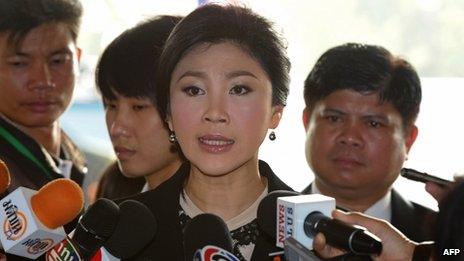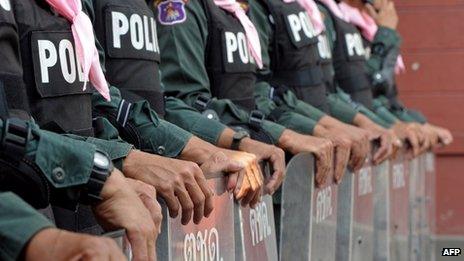Thailand protesters back on the streets
- Published
Jonathan Head joined protesters on the streets of the city
In almost any other country, the scenes I have witnessed in Thailand the past couple of days would have been unthinkable.
An unarmed crowd of demonstrators, some of them elderly and most decidedly unthreatening, stormed and then occupied the finance ministry in Bangkok.
Later they surrounded the interior ministry. Most of the staff left in a hurry, leaving a few rows of nervous-looking volunteer guards and rolls of razor-wire to prevent it suffering the same fate as the finance ministry.
A protest movement armed with little more than whistles and plastic hand-clappers has been able to mount what comes close to an insurrection against the government, in a middle-income country and economic hub for the South East Asian region.
But then, they did something very similar before, in 2008.
In that year the main government office, including that of the prime minister, was occupied for months, followed by a raid on Bangkok International airport that stranded tens of thousands of tourists.
'Bags of cash'
Thailand seems stuck on a merry-go-round of political conflict, replaying chaotic episodes that were scarcely believable the first time round. Why?
Ask the protesters and the answer is simple. One name. Thaksin Shinawatra.
They are a mix of middle-class city-dwellers and provincial folk from the south, the stronghold of the opposition Democrat party, and they all repeat the same mantras we heard during the last round of "yellow" protests in 2008.
That the former prime minister elevated corruption, always a pernicious problem here, to new heights; that he tried to control everything, and is still doing so from self-imposed exile, through his sister Yingluck, the current prime minister.

Yingluck Shinawatra has called for calm and invoked the Internal Security Act
No-one doubts the hold Mr Thaksin still has over his party, and his sway over important government decisions. He is, after all, his party's biggest vote-winner, despite living abroad for five years.
There is a continuous shuttle of ministers and officials to consult with him in Hong Kong, Dubai, or wherever else he happens to be.
There are also dark rumours of bags of cash leaving the country, though these are impossible to confirm.
But the common assumption has always been in Thailand that government projects allow "funds" to be siphoned off for well-connected people.
This government has embarked on an unprecedented spending spree, including a rice subsidy scheme costing many billions of dollars a year, a massive water management plan following the floods of 2011, and planned infrastructure investments totalling more than $600bn (£370bn).
Mr Thaksin's opponents fear these projects will generate so much slush money that the Shinawatras will be able to buy enough influence to dominate the country for many years to come, at a time when Thailand is quietly bracing itself for the end of the reign of King Bhumibol Adulyadej, the monarch seen as the spiritual and moral core of the nation.
This is the narrative that in their minds justifies these outbreaks of lawlessness.
Years of turmoil
We hear less from the government's supporters these days. They have been careful to confine their rallies to a single stadium in Bangkok, to avoid potentially bloody clashes.
But we do know their own, equally heartfelt convictions, from previous turmoil.
They resent being dismissed by the "yellow" protesters as uneducated, ignorant of Mr Thaksin's true nature.
They like his broadly populist policies, and treasure the power of their votes that have given his parties victories in five successive elections.
They are offended that the results of those elections have so often been invalidated by the courts or the army.
These viewpoints remain as irreconcilable today as they have been for the past eight years of turmoil.
What is also unchanged is the extreme reluctance of the police and army to referee this conflict.
The police have performed badly in attempting crowd control in the past, and made little effort this time to stop the blockading and occupation of ministries.
The army did even worse when it was deployed in 2010, against Mr Thaksin's supporters, not his opponents, who were blockading much of Bangkok.

There has been increased security outside parliament
More than 90 people were killed, most by army gunfire.
So the government has invoked the Internal Security Act. It is considering emergency rule, which would permit the deployment of the army. It has got an arrest warrant for the protest leader, Suthep Thaugsuban.
None of these measures will do much to restore its authority, though, without a willing army or police force.
Thailand is starting to look ungovernable, although the outcry from the business community may bring political leaders to their senses.
And what of the man himself - Thaksin Shinawatra?
We've heard nothing from him lately. But if asked, he would doubtless say, as he has many times in the past, that he just wants to live quietly, and perhaps come back to his country one day, to find some way to serve it again.
No-one would believe such implausibly humble aspirations of course.
Mr Thaksin is a driven, ambitious man. But he is just a man.
And it is extraordinary to watch an entire country, still utterly transfixed by him, and unable to move on.
- Published25 November 2013
- Published12 November 2013
- Published7 November 2013
- Published1 November 2013
- Published11 January 2012
- Published19 May 2011
- Published13 July 2012